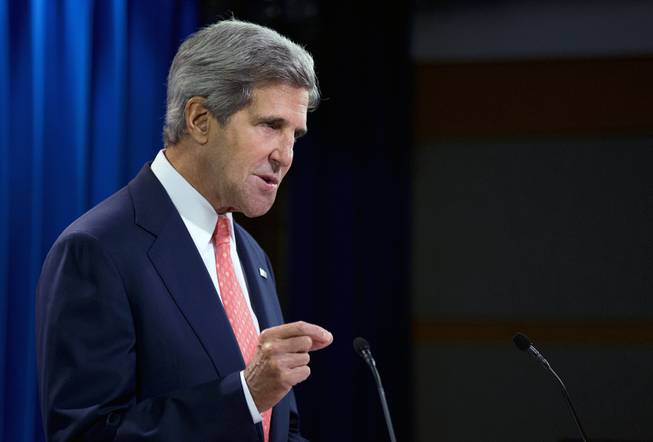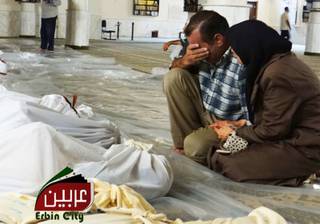
ASSOCIATED PRESS
Secretary of State John Kerry speaks at the State Department in Washington, Monday, Aug. 26, 2013, about the situation in Syria. Kerry said chemical weapons were used in Syria, and accused Assad of destroying evidence.
Tuesday, Aug. 27, 2013 | 12:10 a.m.
WASHINGTON — Secretary of State John Kerry said Monday that the use of chemical weapons in attacks on civilians in Syria last week was undeniable and that the Obama administration would hold the Syrian government accountable for a “moral obscenity” that had shocked the world’s conscience.
In some of the most aggressive language used yet by the administration, Kerry accused the Syrian government of the “indiscriminate slaughter of civilians” and of cynical efforts to cover up its responsibility for a “cowardly crime.”
Kerry’s remarks at the State Department reinforced the administration’s toughening stance on the Syria conflict, which is now well into its third year, and indicated that the White House was moving closer to a military response in consultation with America’s allies.
Administration officials said that although President Barack Obama had not made a final decision on military action, he was likely to order a limited military operation — cruise missiles launched from U.S. destroyers in the Mediterranean Sea at military targets in Syria, for example — and not a sustained air campaign intended to topple Bashar Assad, the Syrian president, or to fundamentally alter the nature of the conflict on the ground.
In the coming days, officials said, the nation’s intelligence agencies will disclose information to bolster their case that chemical weapons were used by Assad’s forces. The information could include signals intelligence — intercepted radio or telephone calls between Syrian military commanders.
Officials said it was conceivable military action could still be averted by a dramatic turnabout on the part of the Assad government, or by the Russian government that has been supporting it. But they said there were few expectations that this would happen.
Although the United States was consulting with allies, administration officials said they had largely abandoned hopes of obtaining any authorization for action in the U.N. Security Council, given the all-but certain veto from Russia.
In a move that reflected its differences with the Kremlin over a possible U.S.-led military operation against Syria, the Obama administration has decided to postpone an upcoming meeting with the Russians on the crisis. A Russian delegation had been scheduled to meet this week in The Hague with Wendy Sherman, the undersecretary of state for political Affairs, and Robert Ford, senior U.S. envoy to the Syrian opposition, to discuss plans for a peace conference to end the fighting in Syria.
A senior State Department official said Monday night that the session would be postponed because of the administration’s “ongoing consultations about the appropriate response to the chemical weapons attack in Syria.”
Other signs of Western momentum toward a military response also took shape Monday. Britain’s prime minister, David Cameron, cut short a vacation to deal with Syria, and the foreign ministers of Britain and Turkey suggested that bypassing the U.N. Security Council was an option. France’s foreign minister, Laurent Fabius, said inaction was unacceptable.
“The only option I do not envisage is to do nothing,” Fabius told Europe 1, a French radio station. France has been a close ally of the rebels seeking Assad’s ouster in the country’s civil war.
News media in Cyprus, where Britain maintains a military air base that is less than 100 miles from Syria’s coast, reported stepped-up flights there in recent days, although such activity may not have been unusual.
Kerry spoke hours after U.N. inspectors were finally allowed access to one of the attack sites, despite shooting from unidentified snipers that disabled their convoy’s lead vehicle. The inspectors still managed to visit two hospitals, interview witnesses and doctors and collect patient samples for the first time since the attack last week that claimed hundreds of lives.
U.N. Secretary-General Ban Ki-moon said in a statement after the assault that he had told his top disarmament official, Angela Kane, who was visiting Damascus, to register a “strong complaint to the Syrian government and authorities of opposition forces” to ensure the inspectors’ safety. There was no indication that any inspection team member had been hurt.
Ban’s spokesman, Farhan Haq, told reporters at a regular daily briefing at U.N. headquarters in New York that the assailants, who had not been identified, fired on the first vehicle in the convoy, which was “hit in its tires and its front window.”
“Ultimately,” he said, “it was not able to travel farther.”
Anti-government activists posted videos online of U.N. inspectors in blue helmets arriving in the Moadamiya area, southwest of the capital, where they were shown entering a clinic and interviewing patients.
The visit by the U.N. inspectors to the Damascus suburb, in a half-dozen vehicles escorted by Syrian security forces, came shortly after Assad denied that his forces had used poison gas.
In an interview with the Russian newspaper Izvestia, published Monday, Assad said accusations that his forces had used chemical weapons were an “outrage against common sense” and warned the United States that military intervention in Syria would bring “failure just like in all the previous wars they waged, starting with Vietnam and up to the present day.”
Obama administration officials said Kerry’s statement was calculated to rebut the claims made by Syria and its longtime patron, Russia, that the rebels were somehow responsible for the chemical weapons attack, or that Assad had made an important concession by giving the U.N. investigators access.
Kerry said that on Thursday he told Walid al-Moallem, the Syrian foreign minister, that if the Assad government had nothing to hide it should provide immediate access to the attack site.
“Instead, for five days, the Syrian regime refused to allow the U.N. investigators access to the site of the attack that would allegedly exonerate them,” Kerry said. “Instead, it attacked the area further, shelling it and systematically destroying evidence.”
For Kerry, the denunciation of Assad carries a personal edge. As a senator in 2009, he met with Assad in Damascus to explore the possibility of building a more constructive relationship with Syria after a long chill. On Monday he accused Assad of “the indiscriminate slaughter of civilians.”
On Capitol Hill, top House and Senate Republicans called on the administration to confer with lawmakers before any military strike and to make the case to a skeptical public. The White House on Monday reached out to Speaker John A. Boehner after Boehner’s office noted publicly that he had not heard from the president on Syria.
“The speaker made clear that before any action is taken there must be meaningful consultation with members of Congress, as well as clearly defined objectives and a broader strategy to achieve stability,” said Brendan Buck, a spokesman for Boehner.
Others welcomed the signals from the administration that it was preparing to take action. Sen. Bob Casey, D-Pa., said Assad “has crossed more than a red line and the United States must act in the interest of our national and global security.”
In Israel, a senior government official made a similar argument and suggested that Iran would be monitoring how the United States and its allies responded.
Yuval Steinitz, Israel’s minister of international affairs, strategy and intelligence, told reporters at a briefing Monday morning in Jerusalem that it was “crystal clear” that Assad’s forces used chemical weapons last week and called the U.N. investigation effort a “joke.”
Steinitz said that Iran, which provided arms to the Assad government and sent members of its paramilitary Quds force to fight with the Syrian military, should also be held responsible. “This is a kind of hypocrisy.”
In the latest round of U.S. consultations on Syria, Obama spoke by telephone Monday with Prime Minister Kevin M. Rudd of Australia about possible responses to the attack, and Susan E. Rice, the national security adviser, met with a delegation of senior Israeli officials for talks that covered Iran, Egypt, Syria and other security issues.
The Israeli delegation was led by Yaakov Amidror, chairman of Israel’s National Security Council and the national security adviser to Prime Minister Benjamin Netanyahu.
Even as the United States and its allies considered their next steps, the toll from the attack continued to mount.
Doctors Without Borders reported Saturday that 3,600 patients had been treated at three hospitals it supports for symptoms that appeared to stem from exposure to chemical weapons.
On Monday, the group said 70 volunteers who had taken care of these patients in one of the hospitals had also become ill and that one had died.


Join the Discussion:
Check this out for a full explanation of our conversion to the LiveFyre commenting system and instructions on how to sign up for an account.
Full comments policy